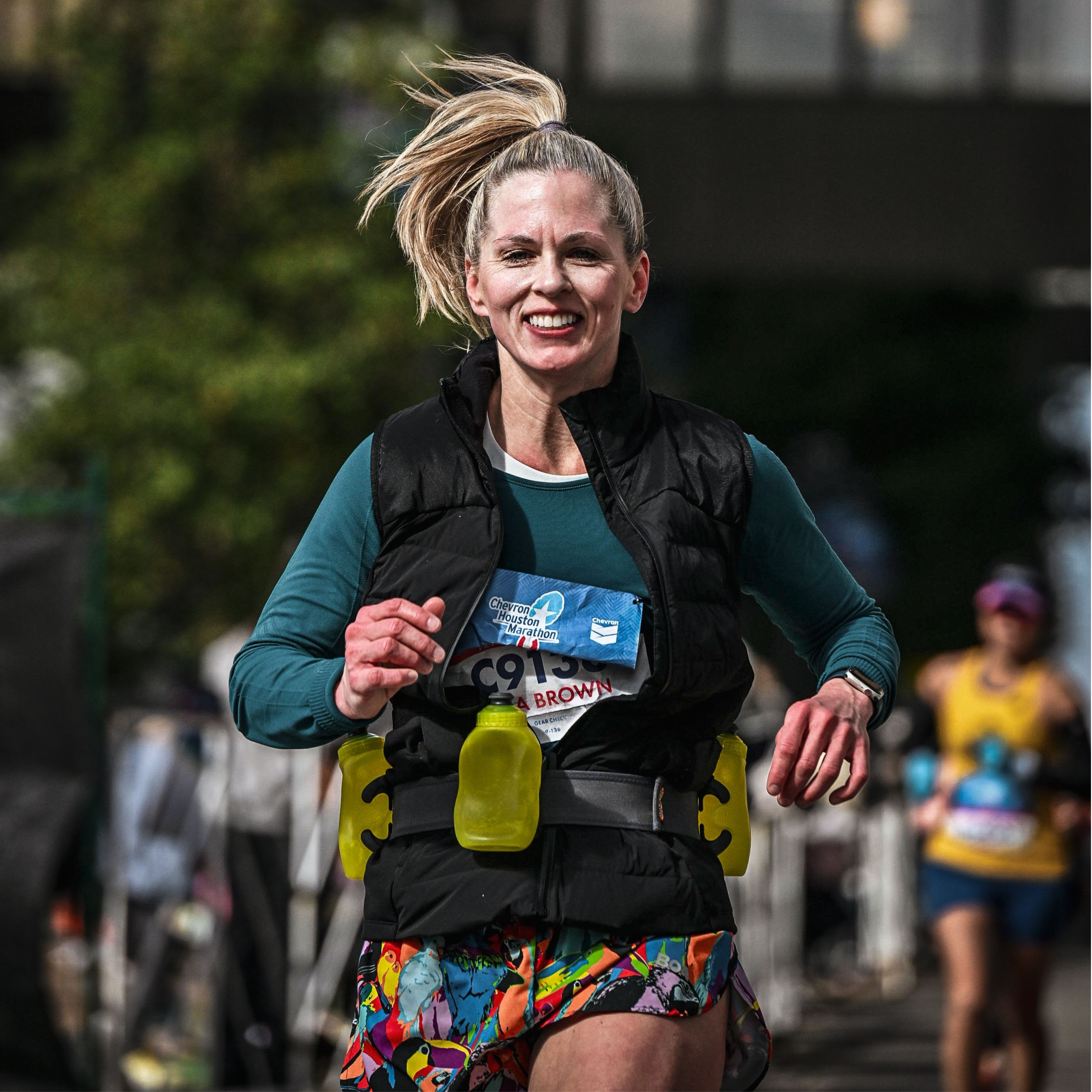Race Day Nutrition: Dos and Don’ts to Avoid a Bonk

Race Day Nutrition:
A Guide To The Perfect Pre-Race Breakfast, In-Race Fueling And Recovery Meal.
You are probably familiar with the adage: “It’s not about the outcome—it’s about the process.” As a long-distance runner and endurance sports dietitian, I embrace this philosophy myself – but I also know that perception is reality. Feeling awful during your race, and even worse, bonking on race day can steal your runner’s high and positive self-talk in an instant.
Rest assured. Low energy and bonking are avoidable with a race day nutrition plan. This article will cover some distance discussing Dos and Don’ts to Avoid a Bonk, written by your trusted sports dietitian and fellow runner, Jena Brown. (That’s me!)
First, let’s discuss what to eat before your race starts: pre-race breakfast.
Pre-Race Breakfast
On race day, your first fueling stop is pre-race breakfast. A solid pre-race breakfast designed for performance should be high-carb, moderate protein, and low to moderate fat and fiber.
Breakfast Planning Is Based On 3 Things:
-
Body weight
-
Timing
-
Tolerance
You need to know your body weight in kilograms to calculate your carbohydrate needs. (PRO TIP: Divide your body weight in pounds by 2.2 to find your body weight in kilograms. Do that now and keep this number handy.)
Then, decide if you want to follow a 2-hour or 3-hour pre-race breakfast before your race. Which one you choose may depend on race morning logistics and individual tolerance, but more than likely, neither option will result in an enjoyable meal experience.
This meal is designed for function.
A 3-hour pre-race breakfast gives you more protein, which can help reduce muscle breakdown, stabilize blood sugar, and minimize stress during your race. This can help extend endurance, which is what you’re there for, right?
According to the International Society of Sports Nutrition (ISSN) Position Stand on Nutrient Timing, endurance athletes should aim for 1-4 grams of carbohydrates per kilogram before higher-intensity, longer duration sessions lasting over 90 minutes.
There are no established protein guidelines before training or racing, but the suggested protein amounts below are based on what I have found to most benefit my endurance athletes and can be tolerated with practice.
Here is an example pre-race breakfast plan for a 130-pound athlete (59 kilograms):
| 2-Hour Pre-Race Breakfast | 3-Hour Pre-Race Breakfast |
| 2 g/kg carbohydrate ~15-20 g protein |
3 g/kg carbohydrate ~20-30 g protein |
| 1 bagel 2 medium bananas 4 oz orange juice 1 boiled egg |
1 bagel 2 Tbsp jam 2 medium bananas 16 oz orange juice 2 boiled eggs |
It is not a good idea to wake up on race morning and try to eat a meal like this unless you are used to it and have practiced it during training.
I recommend practicing a 2-hour pre-race breakfast before weekend long runs or rides so that you are familiar with the foods and how well you digest and tolerate them during your training session.
The next fueling stop on race day is intra-race fueling.
ADVERTISEMENT

Intra-Race Fueling
Your primary source of energy during your race will be carbohydrates. The longer distance you are covering, the more important protein and fat will need to be incorporated into your fueling plan.
Athletes should aim for at least 30 to 60 grams of carbohydrates per hour, but this may not be enough if you cover distances lasting over 2.5 hours. In this case, athletes can benefit from up to 75-90 grams of carbohydrates per hour to maintain blood sugar levels and avoid bonking.
Energy gels and sports products vary widely. If you plan to fuel with more than 60 grams of carbohydrates per hour, include a product with fructose and multiple sources of carbohydrates. It is best to work with a sports dietitian experienced in endurance (that’s me!) to create an individual race fueling and hydration plan to minimize your risk of GI distress and avoid bonking.
Including a small amount of protein in your fueling plan may also help reduce muscle soreness and creatine kinase levels (a marker for inflammation from muscle breakdown) after your race. According to the ISSN Position Stand on Protein and Exercise, endurance athletes may want to consider incorporating approximately 5-10 grams of protein, or 0.25 g/kg, per hour during exhaustive endurance exercise.
Finally, let’s talk about recovery.
Post-Race Recovery
Your race is not over when you cross the finish line. Crossing the finish line may have been one of your goals, but thriving afterward should be a goal, too. It is possible to finish a race with minimal muscle soreness, a good mood, and mental presence. Can you guess how?
Proper recovery nutrition!
Prioritize protein, carbohydrate, and fluid for post-race recovery.
Protein is your best friend after you have endured long distances and long hours to reduce muscle breakdown and begin the recovery process.
Carbohydrate foods and fluids are important for restoring muscle glycogen stores, reducing muscle soreness, and minimizing inflammation.
Fluids containing electrolytes are essential for blood flow and nutrient delivery to recover faster.
If you are not very hungry, try a liquid recovery option that can also help rehydrate with fluid and electrolytes.
Aim for at least 20-40 grams of protein immediately after your race.
2 Sports Dietitian-Approved Post-Race Recovery Meals
- 14 oz ultra-filtered milk (26 g protein) with fresh fruit and 8 oz pure tart cherry juice not from concentrate
- 2 plant-based whole food protein bars with at least 10 grams of protein per bar with 16 oz orange juice
Repeat the recovery process in 2 hours with a larger meal. By this time, your appetite should have returned or improved.
Your post-race recovery meal fuels you across the final finish line. Let’s sum it up.
Finish Line
You nailed it! A sports dietitian has unveiled race-day nutrition strategies to help you avoid bonking and crush your next race.
If you are looking for more individualized guidance, let’s race, fuel, and recover stronger together. I have over 15 years of experience as a dietitian and over 20 years of experience in long-distance running. Let’s create a race day nutrition plan for you!
ADVERTISEMENT

Jena Brown, RD, CSSD, ISAK-1 is a sports dietitian for endurance athletes and owner of Victorem Performance Nutrition. She has over 15 years of experience and has worked with endurance athletes across the U.S. from beginner races to Ironman and ultra distances. Jena lives in Texas where she works with athletes in-person across the state and virtually across the U.S. As a wife, mom of four, and long-distance runner for over 20 years, she understands the wide range of challenges that come with fueling as an athlete, working as a professional, and having a family.








